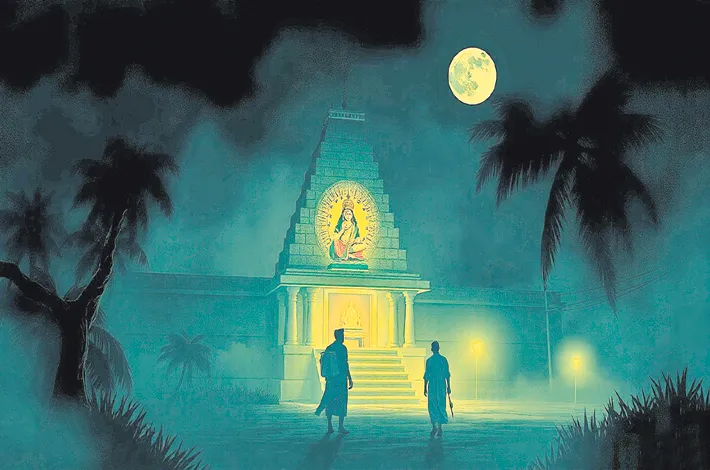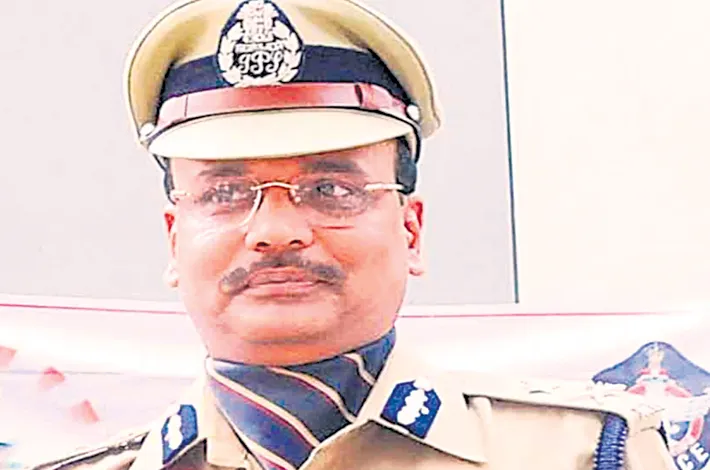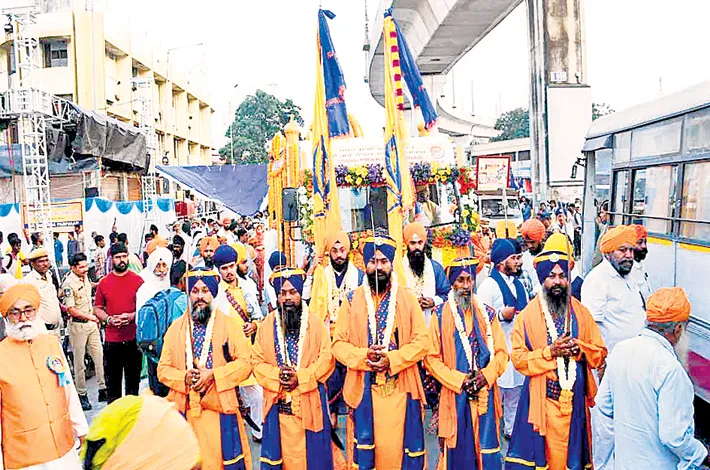The Shadow in Mallapalli
15-09-2025 12:00:00 AM

In the dusty, sun-scorched village of Mallapalli, Nalgonda district, where the Deccan plateau stretched under an unrelenting sky, life moved at the pace of a bullock cart. The village, cradled by rocky hills and sparse fields, was a place where secrets clung to the air like the scent of parched earth after rain. It was 2025, and while the world beyond buzzed with technology, Mallapalli remained tethered to its traditions—until the theft at the Venkateswara temple shattered its quiet.
Detective Vikram Reddy, a lean man with sharp eyes and a perpetual frown, arrived in Mallapalli on a sweltering September afternoon. A former Hyderabad cop turned private investigator, Vikram had been summoned by the temple’s head priest, Srinivas Rao. The temple’s prized possession, a 200-year-old silver idol of Lord Venkateswara, had vanished from the sanctum sanctorum two nights prior. The theft had sparked whispers of curses and divine wrath among the villagers, but Vikram trusted neither gods nor gossip.
The temple sat atop a small hill, its gopuram weathered but proud. Srinivas Rao, a wiry man with a trembling voice, met Vikram at the entrance. “The idol was here during the midnight aarti,” he said, pointing to the empty pedestal. “By morning, it was gone. No broken locks, no footprints. Only the gods know how.”
Vikram examined the sanctum. The stone floor was swept clean, the walls bare except for faded murals. The pedestal, carved from black granite, showed no signs of tampering. A narrow window, barely a foot wide, overlooked the hill’s slope, but it was too small for a thief to slip through. “Who else has access to this room?” Vikram asked.
“Only me and Gopal, the assistant priest,” Srinivas replied. “And Lakshmi, the sweeper. But they’ve been with the temple for years. They’re family.”
Vikram’s first stop was Gopal, a stout man in his forties who lived in a mud house near the temple. Gopal’s hands shook as he poured tea. “I locked the sanctum after the aarti,” he insisted. “I swear on my ancestors, I saw the idol before I left.” His eyes darted to a small shrine in his home, where a photo of his late wife sat garlanded. Vikram noted the man’s nervous tic but moved on.
Lakshmi, the sweeper, was a frail woman in her sixties, her fingers gnarled from years of labor. She met Vikram at the village well, her sari damp from washing. “I clean the temple at dawn,” she said. “When I entered, the idol was gone. I told Srinivas immediately.” Her gaze was steady, but Vikram caught a flicker of fear when he mentioned the police. He let it pass—for now.
The village buzzed with theories. Some blamed a gang from Hyderabad, others whispered of a curse tied to an old feud between two families, the Reddys and the Naidus. Vikram visited the local tea stall, where gossip flowed as freely as chai. An old man, Ramayya, leaned close. “Check the Naidu boy, Kiran. He’s been acting strange, always sneaking around at night.” Vikram thanked him and added Kiran Naidu to his list.
Kiran, a lanky 20-year-old, worked at a kirana shop owned by his uncle. When Vikram questioned him, Kiran’s answers were clipped. “I was home that night,” he said, avoiding eye contact. “Ask my mother.” His mother, a stern woman named Sarojini, confirmed his alibi, but her tone was rehearsed, as if protecting a fragile truth.
Vikram returned to the temple at dusk, the air thick with the scent of jasmine from evening prayers. He examined the sanctum again, this time noticing a faint scratch on the pedestal’s base, barely visible. It suggested something heavy had been dragged. He followed the imaginary trail to the window, where a smudge of red soil clung to the sill. Mallapalli’s soil was black, but the hills nearby held pockets of red clay. Someone had been outside.
Under the cover of night, Vikram trekked the hill’s slope, his flashlight catching glints of mica in the rocks. Near a cluster of boulders, he found a patch of disturbed red clay, as if someone had dug recently. He scraped the surface and unearthed a cloth bundle. Inside was the silver idol, its eyes glinting in the moonlight. Vikram’s pulse quickened, but he covered it back and set a trap.
He hid among the boulders, waiting. Hours passed, the night alive with crickets. At 2 a.m., a figure approached, moving stealthily. It was Kiran Naidu, carrying a spade. As he began to dig, Vikram stepped out, his flashlight pinning the boy. “Looking for something?” he asked.
Kiran froze, then crumpled. “I didn’t want to steal it,” he stammered. “It was Gopal’s idea. He said we’d sell it in Hyderabad, split the money. My family’s drowning in debt. I had no choice.”
Vikram escorted Kiran to the village, waking Srinivas and Gopal. Gopal’s face paled when he saw the idol in Vikram’s hands. “You used Kiran,” Vikram said. “You knew the temple’s routines, the window’s blind spot. You hid the idol, planning to retrieve it later.” Gopal’s silence was confession enough.
At dawn, the idol was restored, and the village exhaled. Gopal and Kiran were handed to the Nalgonda police, though Vikram suspected Kiran’s youth might earn him leniency. As he left Mallapalli, the temple bells rang, and Vikram wondered if the gods had indeed watched—or if shadows like him were all the village needed.








